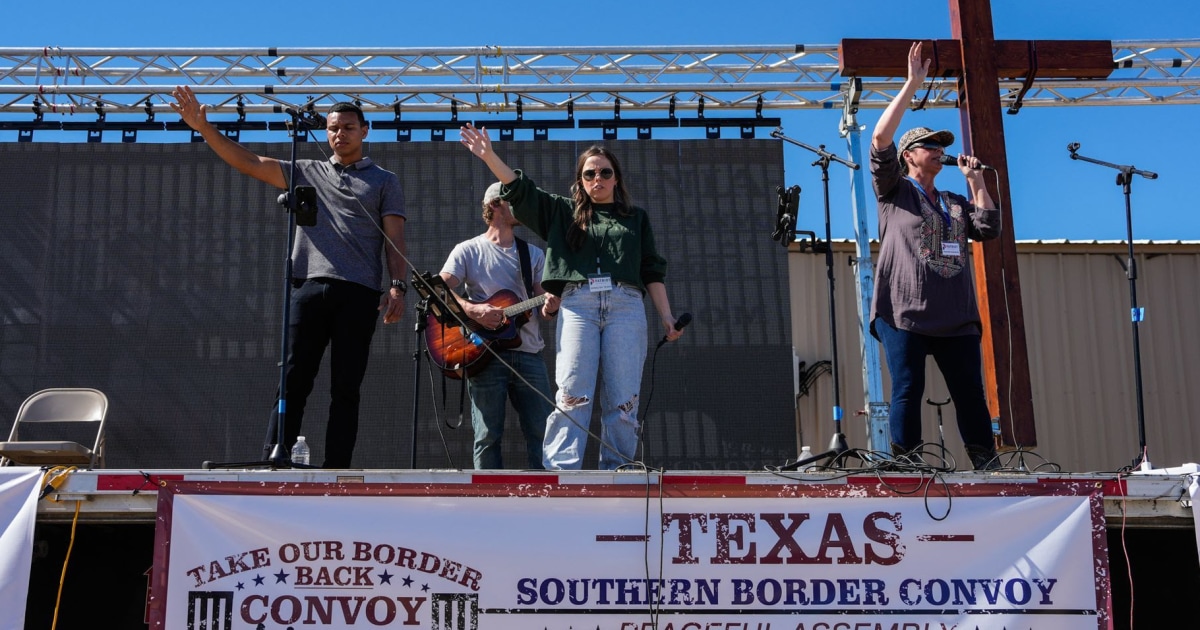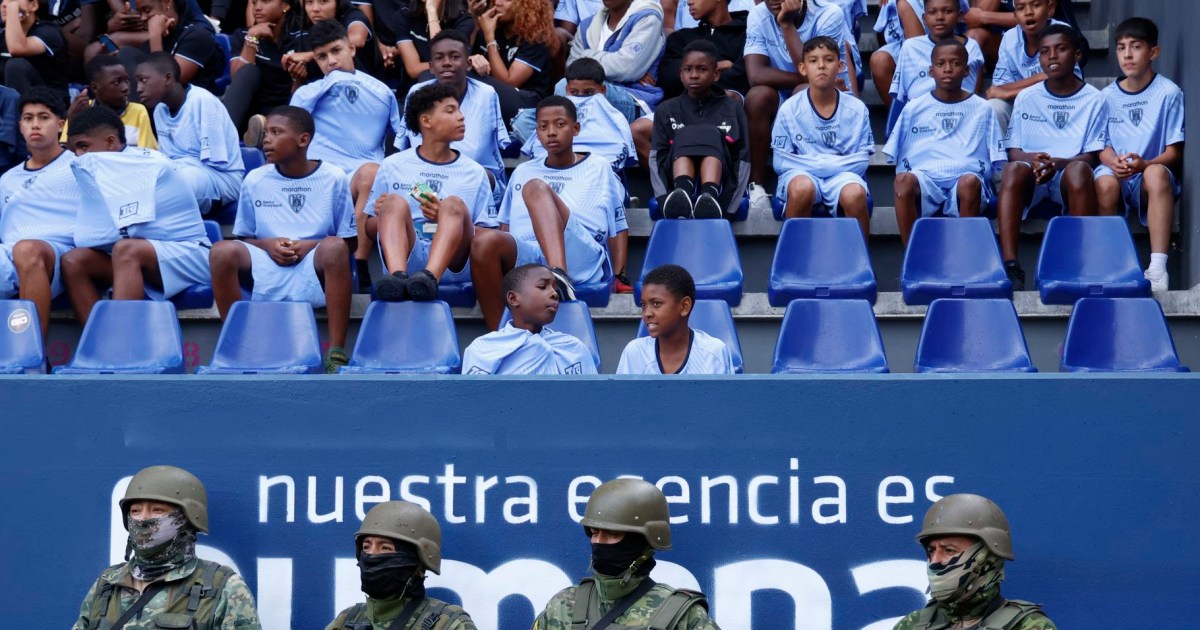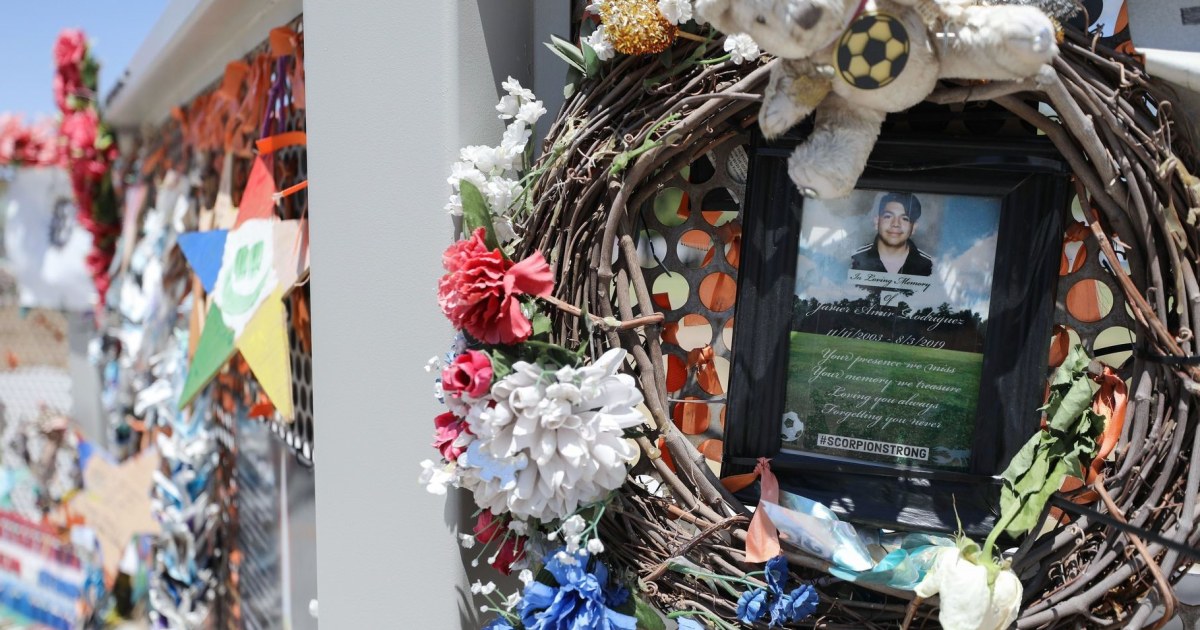By Marina E. Franco and Russell Contreras
Welcome to Axios Latino, a newsletter designed to tell you every week the stories that have a special impact on the Latino communities in the United States and in Latin America.
If you are interested in subscribing and receiving it in your mail [in English], you can do so by clicking here.
Every week we will publish the
newsletter
in Spanish here on Noticias Telemundo for those who prefer it that way.
[
Sign up here to read the newsletter in Spanish
]
1 theme to highlight: Despite the thirsty communities in the face of the heat wave, climate cooperation dries up
An extreme heat wave is melting
the southwestern United States and northern Mexico, which were already suffering a crisis due to the reduction in the flow of the Colorado River, an example of the cross-border effects of climate change.
On the left side, the practically dry part of the Colorado River in Mexico.
On the right side, the historically low levels at the Hoover Dam. Photos by Alejandro Cegarra / Noticias Telemundo;
Ethan Miller / Getty Images
What's Happening:
Temperature records have been broken and forest fires are already beginning, coupled with a barely unprecedented drought.
Everything shows the need for both countries to collaborate against global warming, although for now the focus is almost exclusively on migration.
Few places have been as affected by the conditions as San Luis Río Colorado, in the Mexican state of Sonora, where the Cucapá indigenous community (whose name means people of the river) has practically been left without access to water.
Most of the water is directed to agricultural purposes or remains in dams on the north side of the border.
The general situation:
Mexico and the US have had several high-level meetings since President Joe Biden took office, but climate change has barely been on the agenda.
The Mexican president, Andrés Manuel López Obrador, has prioritized oil and coal, and promoted reforms that would make it difficult to invest in and develop renewable energy.
In his own words
: "The challenge we face now is how to get seven [US] states and two countries to cooperate to figure out how to cope with the next few decades having much less water than we expected," John Entsminger told NBC. , from the Southern Nevada Water Authority.
2. A hunger strike when the future of the Dreamers is still in suspense
Nine years have passed for the DACA program and dreamers are still waiting for a law that allows them to legalize
June 15, 202102: 05
The Senate kicked off
hearings on the American Dream and Promise Act of 2021
this week
, paving the way for a vote in the near future, three months after the House of Representatives endorsed the measure.
And there are many expectations.
More details
: The HR 6 law would establish mechanisms so that some migrants who have lived in the US for decades can formally obtain residency and citizenship.
About six million people would benefit, half of them young people who were brought to the United States as children without knowing another home and who are studying or working (including as medical personnel during the pandemic).
Agricultural and tepesian workers (who received temporary TPS status after being affected by conflict or weather disasters) could also access a
green card
.
Of the six million, 600,000 are people with DACA, but their status remains largely undefined.
The permanence and future of the executive action have been uncertain for several of its nine years of existence and there are significant delays in the proceedings.
Highlight
: Around 70% of the population supports that these groups can regularize their immigration status, according to various surveys.
Hot news:
A group of Dreamers went on a hunger strike this week to push for laws like HR 6.
One of the participants told Noticias Telemundo that they want above all to highlight the urgency of such a measure given that many essential workers, despite their significant work, are undocumented.
3. Behind the arrests of opponents in Nicaragua
Four presidential candidates
and nine well-known dissidents have been detained in recent weeks, and the whereabouts of several more are unknown.
It is the most brazen hunt for opponents in recent Nicaraguan history.
But the actions along these lines by the regime of Daniel Ortega and Rosario Murillo have been going on for a long time: before the recent arrests, there were already some 130 people considered political prisoners in the country due to the anti-government protests that began in April 2018.
The background
: Ortega came to power in 1984 after the Sandinista Front, of which he was one of the leaders, removed dictator Anastasio Somoza from power.
The Somozas had ruled for four decades with the backing of the United States.
But the people ousted Ortega from power in the 1990 vote, fatigued by the fighting against the Contras, right-wing rebel groups financed by Washington.
Ortega had three failed presidential nominations before returning to office in 2006. Since then, he has become increasingly entrenched in power, and his critics say he has become the very thing he once fought.
The general situation
: Ortega and Murillo aim to obtain a fourth consecutive term in the elections scheduled for November.
Now they would no longer have weight competition.
It was to be the first vote since paramilitaries cracked down on massive protests against the regime, which were organized by a coalition of students, businessmen and religious leaders.
Thousands of people had to flee the persecution, the majority towards Costa Rica.
4. The possible reopening of the border centers the meeting of Mexico and the United States.
The United States confirms its intention to reopen the border with Mexico as soon as possible
June 17, 202100: 21
How to move forward to reopen the border flow
, which has been restricted by the pandemic, was one of the main topics discussed during the visit to Mexico by the Secretary of National Security, Alejandro Mayorkas.
More details:
The border has been closed for non-essential activities for more than a year, devastating the related commerce and tourism industries.
Coinciding with the bilateral meeting on Tuesday, 1.35 million vaccines donated by the United States arrived in Mexico.
They will be used to immunize people between the ages of 18 and 39 who live on the border and thus facilitate its reopening.
Collaborations to address migration were also discussed at the meeting.
News fact:
While Mayorkas was in Mexico, the secretariat he directs announced an expansion of the program for Central American minors with which they can legally migrate to reunite with relatives in the United States.
The program was dismantled by Trump but recovered in March and seeks to provide mechanisms for minors to avoid the dangerous journey to the border on foot and without company.
The attorney general, Merrick Garland, also reversed restrictions on Wednesday with which people who are victims of gang or sexist violence could not request asylum.
5. A watershed for the Latin American LGBTQ community
Vicky Hernández was 26 years old.
She was last seen during the 2009 coup in Honduras, when a patrol approached her while there was a curfew Illustration by Annelise Capossela / Axios with image provided by Cattrachas Observatory
Eleven years after the murder of Honduran
Vicky Hernández, the Inter-American Court of Human Rights has taken up her case and could set a key precedent for the entire region.
The court must determine if the Honduran government failed to protect her as a trans person and if it should then pay reparations to her family.
The general situation:
Every day a murdered LGBTQ person dies in Latin America and the Caribbean, according to a regional organization of groups that study hate crimes.
Activists note in particular that the region has the highest concentration of transhomicides, with Honduras and Brazil as hot spots.
Latin American trans people have a life expectancy of just 35 years due to the violence they face, in contrast to 79 years and 73 years for cisgender men and women.
Read more about the case of Vicky Hernández [in English]
6. Clashes from five decades ago still reverberate in Albuquerque
This city in the state of New Mexico
has just commemorated the 50th anniversary of the protests against police mistreatment of Mexican-Americans, unleashed after teenagers were arrested at a concert.
Why it matters:
The 30-hour confrontations forced law enforcement to acknowledge that there was harassment by officers of Latinos.
Today, Latino rights advocates want to highlight police abuse events like this so that they are part of the discussion of the changes that should follow the death of George Floyd.
The events of 1971 triggered reforms in Albuquerque police, but further changes ordered remain pending after a Justice Department investigation that, in 2014, found that there were still excesses in the use of force.
Read more about the uprising in Albuquerque [in English]
7. Updates from the hemisphere: electoral disputes in Peru and a work stoppage in Colombia
The official counting of the votes
in Peru is over, but neither of the two presidential candidates has been declared the winner.
Although leftist Pedro Castillo has a 0.4% lead, right-wing Keiko Fujimori is contesting thousands of ballots.
The electoral crisis has also been marked by racist and discriminatory accusations.
Colombians who have organized
strikes every Wednesday for the past eight weeks said they will suspend strikes to try to get their demands to prosper as proposed laws.
Due to the repression of the authorities to the protests against socioeconomic inequality, 58 people have died and 84 are still missing.
8. Giving movies green power
In these mobile cinemas in Mexico you do not pay the entrance with money, but with physical effort
May 28, 202101: 50
Communities in Mexico that had never seen a movie
on the big screen now have that opportunity thanks to a company that brings the cinema almost to their homes.
In addition, the public does not pay with money: instead, four members of the audience are asked to pedal stationary bikes in turns that help generate electricity for the sound equipment.
The rest works almost entirely with stored power from solar cells.
In his own words:
"To leave this little seed that there are clean energies, which may germinate in an engineer or a scientist within these children," Aldo Arreola, a collaborator of the initiative called ToTo, told Noticias Telemundo.
Thanks for reading, until next week.
Do you want to read any of the previous editions?
- Drowning for the American Dream
- The pandemic does not give truce, but football continues
- What worries Hispanics most in the US
- The effects of trying to study when there is COVID-19
- Mexico in mourning;
Colombia and Puerto Rico demand justice
- A controversial count that does not favor Hispanics












/cloudfront-eu-central-1.images.arcpublishing.com/prisa/KMEYMJKESBAZBE4MRBAM4TGHIQ.jpg)


